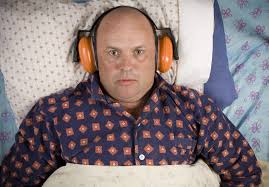There is nothing worse than falling into what feels like a deep and soothing sleep when the next door neighbour brings all their friends home from the local pub and starts to play music and shout loudly. If your neighbours aren’t this way inclined, then I’m sure you’ve experienced something similar with the local dog, the sounds of traffic, or the nearby train station. Maybe you’re unlucky like me and experience all of these on a regular occurrence.
Sound and Sleep
Even as you sleep your brain continues to register and process sounds. That’s why it is normal for noise to easily distract you and wake you from your prized slumber. Even if the noise isn’t great enough to cause you to completely wake up it can still cause a change in heart rate and blood pressure which can mean a disrupted sleep, which can then lead to a feeling of waking up tired and lethargic.
The Factors of Sound
The level of disruption that sound can have on your sleep can come down to several different factors – your stage of sleep, the time of the night and even your personal relationship and feelings to the noise. When you’re still in light sleep you’re more likely to be woken up than when in a deep sleep, whilst sounds tend to have a bigger impact and be more disruptive in the second half of the night, right around the same time the neighbour comes home from the pub. Of course the thing about sound is that each individual has different sensitivity to it, whilst you might struggle to get a good sleep and be consistently woken by noises outside; your sleeping partner might have no such issues.
Your Relationship to Sound
One very interesting fact about sound and sleep is the idea that the impact of sound depends on that particular sounds meaning to you. When it is relevant to you and it involves some sort of emotion you are more likely to wake up. A mother could sleep despite the constant bombardment from her husband’s snoring right next to her and then the next second be fully awoken by the sounds of her baby crying three rooms away. Maybe you could be more prone to traffic noise outside your window if you spend a great deal of your day driving in it.
White Noise
White noise is a sound signal that masks the noises in the background. It helps to drown out sounds which would provide a major obstacle to you falling asleep and staying asleep. It is a constant, unchanging background noise, whilst it may sound counterintuitive; it is effective because it blends the problematic external sounds into the overall background noise, so its overall impact is limited.
Television and Sleep
There’s an important reason why television isn’t recommended as a means to provide effective noise relief. Whilst white noise is a constant and unchanging noise the television is constantly changing in tone and volume. If you want a better night’s sleep it is best to leave your television in a completely different room to the one you sleep in.
How to manage noise pollution
Whether you’re located in a big and vibrant city or a quiet suburban town, noise can play an important role in the quality of your sleep. Sudden noises outside can jostle us awake and then ruin the rest of our night’s sleep. It has also been found that long-term exposure to sound can actually be detrimental to your health.
What are the Solutions?
Luckily there is a plethora of mobile applications that can be used to provide effective relief from the dangers of sound. Throw into the mix a range of innovative sleep sound machines, white noise machines and sound conditioners and you can find a solution to your sound problems. You may even find nature, machinery or ambient soundtracks helpful. Other things like the household fan or even an air purifier can help provide effective noise relief. If all else fails – try some earplugs.
(Photo courtesy of doctorstevenpark.com)






